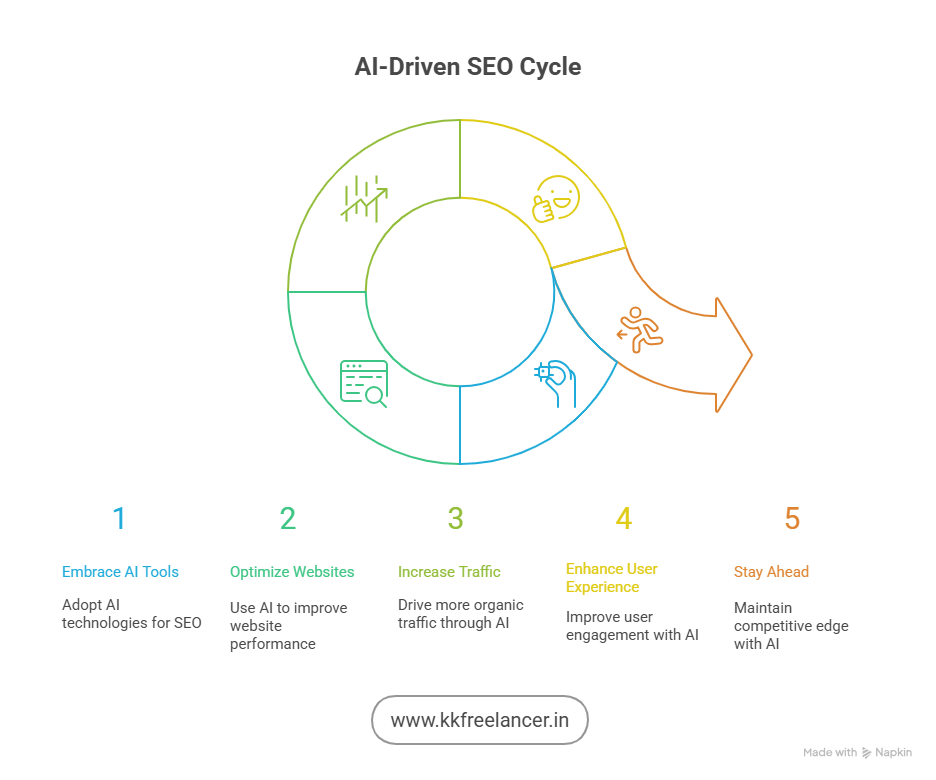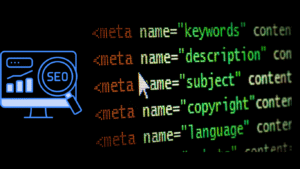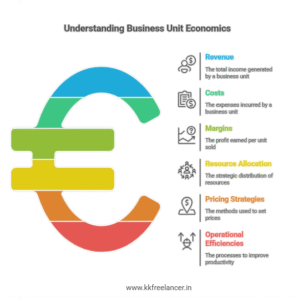In the ever-evolving world of SEO (Search Engine Optimization), staying ahead of the curve is crucial for digital marketers, small business owners, and SEOs alike. With the constant algorithm updates and shifts in search trends, it’s important to embrace new tools and technologies. One such groundbreaking tool that is rapidly changing the landscape is Artificial Intelligence (AI).
AI for SEO is not just a trend—it’s the future. By leveraging AI-driven solutions, businesses can optimize their websites more efficiently, increase organic traffic, and improve user experience. If you’re an SEO professional, a digital marketing learner, or a small business owner looking to enhance your online presence, understanding how AI works for SEO will put you ahead of the competition.
In this article, we will explore the power of AI in SEO, how it can benefit you, and practical ways to integrate AI tools into your SEO strategy.
What Is AI in SEO in 2025?
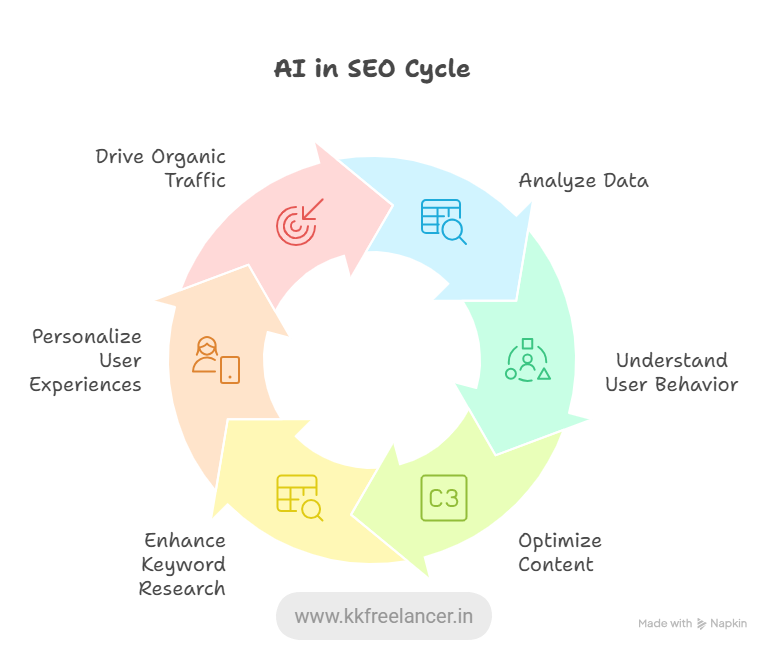
Artificial Intelligence (AI) in SEO refers to the use of machine learning algorithms and data-driven systems to optimize websites for search engines. AI can analyze vast amounts of data to provide insights, automate repetitive tasks, and make predictions about what will work best for SEO strategies.
AI tools for SEO are designed to enhance search engine rankings by mimicking human intelligence, making data-driven decisions, and optimizing content in ways that are difficult for manual processes to achieve. These tools can streamline keyword research, optimize content, and improve the overall structure of a website, making it more likely to rank highly on search engines like Google.
The Role of AI in Modern SEO Stretegy
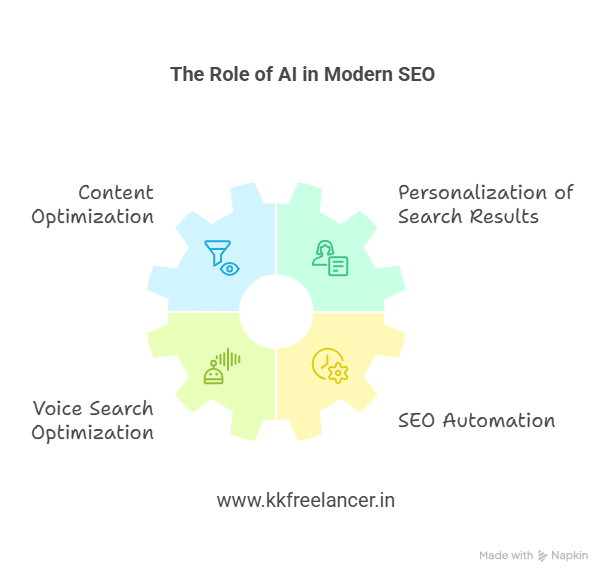
1. Content Optimization
One of the biggest challenges in SEO is creating content that both resonates with the target audience and is optimized for search engines. AI for SEO simplifies this by analyzing search intent and user behavior, allowing marketers to create highly relevant content. Here are some key areas where AI enhances content creation:
- Keyword Suggestions: AI tools can analyze search trends and user queries to suggest the most relevant keywords to target.
- Content Gap Analysis: AI can identify gaps in existing content and suggest new topics to target, ensuring that your website covers all aspects of a particular topic.
- Content Quality and Readability: AI can evaluate content for readability and suggest improvements to make it more engaging.
2. Personalization of Search Results
AI is capable of personalizing search results based on user behavior and preferences. Search engines like Google use AI to rank content according to user intent, rather than just focusing on keywords. With AI-powered SEO strategies, businesses can optimize their websites to cater to personalized search results, enhancing user experience and driving more relevant traffic.
3. Voice Search Optimization
As voice search continues to gain popularity with the rise of smart devices, optimizing for voice search is becoming more important. AI tools can help you understand how people phrase questions and search queries when using voice assistants, allowing you to adjust your SEO strategy accordingly.
4. SEO Automation
SEO is often time-consuming and repetitive, requiring significant manual effort. However, AI can automate many aspects of SEO, from keyword research to link-building and content optimization. Automating these tasks frees up time for digital marketers to focus on more strategic initiatives.
Benefits of AI for SEO in 2025
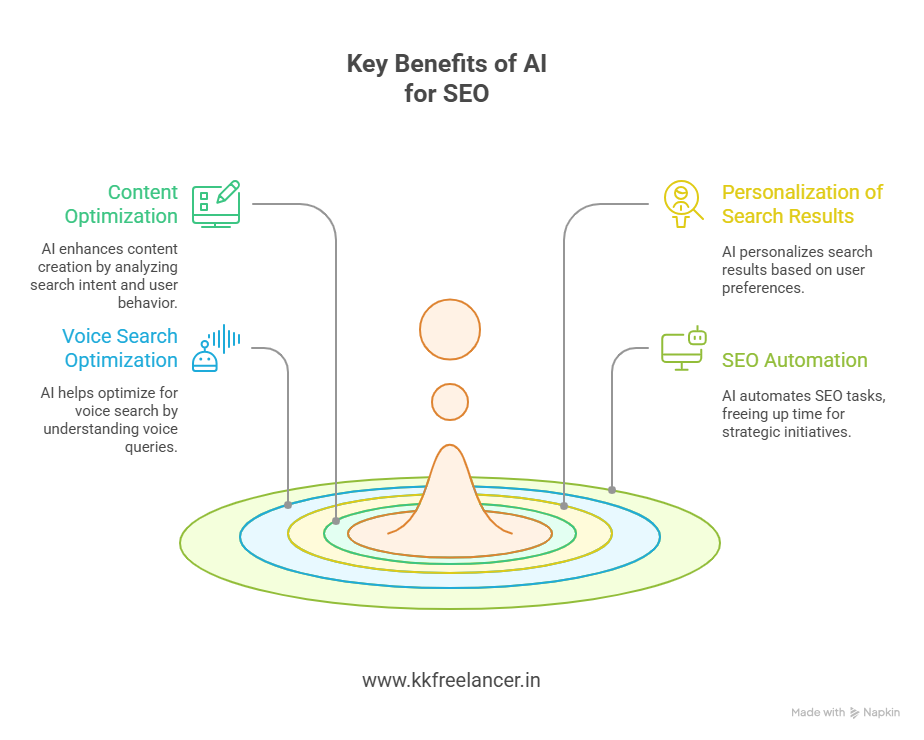
1. Improved Efficiency and Time-Saving
AI can handle tasks like content optimization, keyword research, and SEO audits faster and more accurately than humans. This leads to significant time-saving for SEO professionals. AI tools like Moz or Semrush can automate the repetitive tasks involved in keyword research and site audits, allowing you to focus on the strategic aspects of SEO.
2. Better Search Engine Rankings
AI’s ability to analyze data and user behavior means it can optimize websites in a way that’s more likely to get them ranking higher on search engines. AI can fine-tune content for search intent, user engagement, and keyword relevance, helping to improve the quality of your website’s SEO.
3. Data-Driven Insights
AI systems can quickly process large amounts of data, offering SEO professionals detailed insights that would take humans much longer to gather. These insights can help you make better-informed decisions regarding which keywords to target, how to structure your content, and how to increase your site’s overall visibility.
4. Predictive Analytics
Predictive analytics is one of the most powerful aspects of AI in SEO. With the ability to analyze patterns and trends, AI can predict the success of certain keywords or SEO strategies, helping businesses take a proactive approach to SEO rather than a reactive one.
How AI Can Improve Key SEO Areas
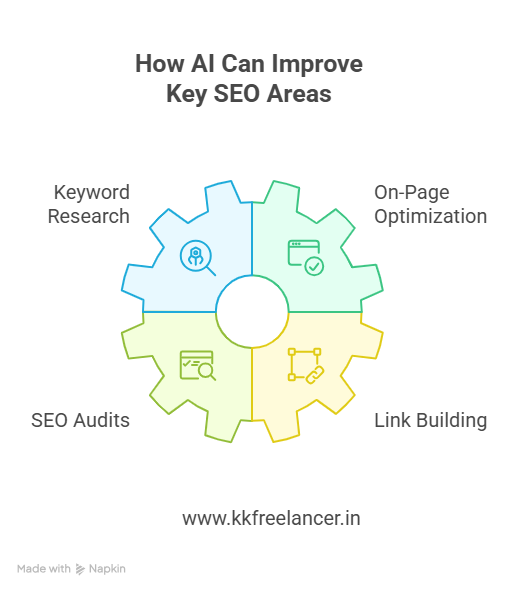
1. AI for Keyword Research
AI-powered tools can make keyword research more efficient and effective. Traditional methods of keyword research involve manual analysis of search volume, competition, and relevance. However, AI tools like Ahrefs and SurferSEO analyze vast amounts of data to suggest relevant keywords based on current trends and user intent.
AI tools help to:
- Identify Low-Competition Keywords: AI can help find long-tail keywords with low competition but high search intent, which can drive more targeted traffic.
- Analyze Keyword Trends: AI-powered keyword research tools can identify emerging trends and shifts in search behavior, enabling you to adjust your strategy accordingly.
2. On-Page Optimization
On-page SEO is essential for ranking well on search engines. AI-driven content tools help automate the optimization of meta descriptions, headings, keyword density, and other important on-page factors. These tools ensure that your content is fully optimized without you having to manually tweak every single aspect.
AI can also provide actionable recommendations for:
- Internal Linking: Suggesting ways to improve your internal linking structure to enhance SEO.
- Image Optimization: Ensuring your images are properly optimized by reducing file sizes and adding alt text.
- Page Speed Analysis: Using AI to recommend improvements for faster page load times, which is a critical ranking factor for Google.
3. SEO Audits
Performing regular SEO audits is essential to ensure that your website remains optimized. AI-powered tools can automate this process and provide in-depth insights about your website’s SEO health. For example, tools like Screaming Frog and DeepCrawl can perform detailed audits, identifying broken links, missing metadata, and other issues that may affect your rankings.
4. Link Building
AI can assist in link-building by analyzing the backlink profiles of top-ranking pages for your targeted keywords. AI tools can then suggest websites that may be interested in linking back to your site, helping to improve your domain authority and rankings.
Real-World Examples of AI in SEO
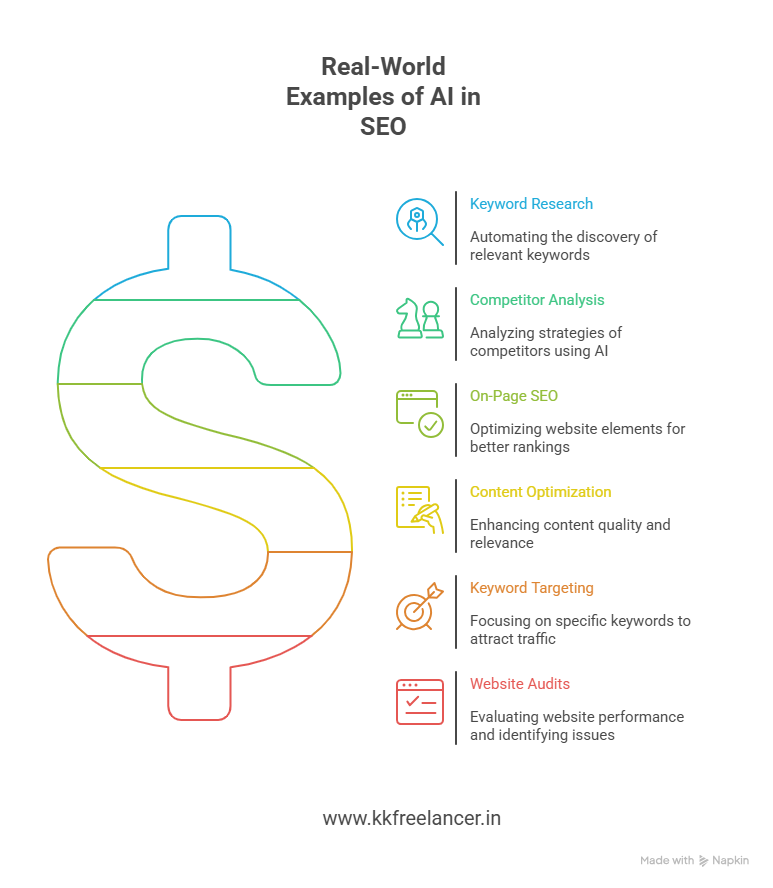
kkfreelancer – An SEO service provider that uses AI tools to automate keyword research, analyze competitor strategies, and optimize on-page SEO for its clients. By incorporating AI, they have seen increased efficiency and improved results in their campaigns.
SEO Services – Many digital marketing agencies now offer AI-driven SEO services. These services leverage machine learning and AI tools to help businesses improve their organic rankings through better content optimization, keyword targeting, and website audits.
How to Implement AI in Your SEO Strategy
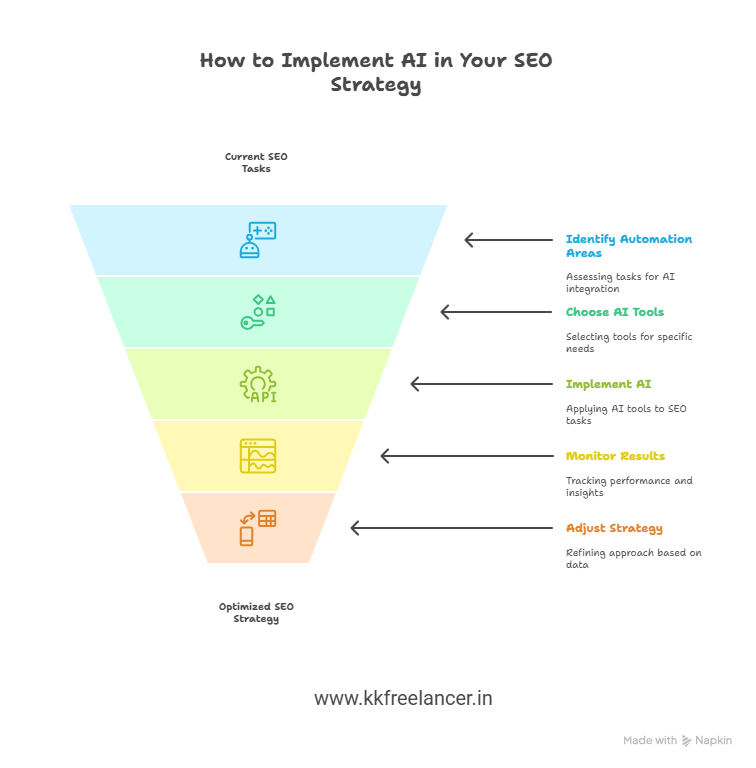
To integrate AI into your SEO efforts, follow these steps:
- Identify the Areas to Automate: Look at your current SEO tasks—content optimization, keyword research, and auditing—and assess where AI can be applied to save time and improve results.
- Choose the Right AI Tools: Choose AI-powered SEO tools that match your needs, such as MarketMuse, Frase, or Clearscope. These tools can help with content creation, keyword research, and optimization.
- Monitor and Adjust: After implementing AI, continue to monitor your results. AI tools will give you actionable insights, but it’s important to refine your strategy as you gather more data.
Conclusion
AI for SEO is not just a passing trend; it’s a transformative tool that can revolutionize the way you approach digital marketing. From improving efficiency and search rankings to offering personalized insights and predictive analytics, AI has the power to elevate your SEO strategy.
By integrating AI into your SEO efforts, whether you’re a small business owner, digital marketer, or SEO professional, you can unlock greater opportunities for growth, gain a competitive advantage, and achieve better results. The future of SEO is here—embrace AI to ensure your place in it.
FAQS
AI for SEO refers to the use of artificial intelligence tools to optimize websites, improve keyword research, content creation, and enhance rankings on search engines.
AI enhances SEO by automating keyword research, optimizing on-page content, predicting trends, and improving user experience, all of which contribute to better rankings.
Popular AI tools for SEO include MarketMuse, Frase, Clearscope, SurferSEO, and Ahrefs, which help with keyword research, content optimization, and SEO audits.
Yes, AI tools can analyze search intent, suggest relevant keywords, and provide insights for creating high-quality, SEO-optimized content that ranks well.
Absolutely! AI-powered SEO tools can help small business owners automate tasks, improve efficiency, and compete with larger companies by enhancing their website’s SEO strategy.


